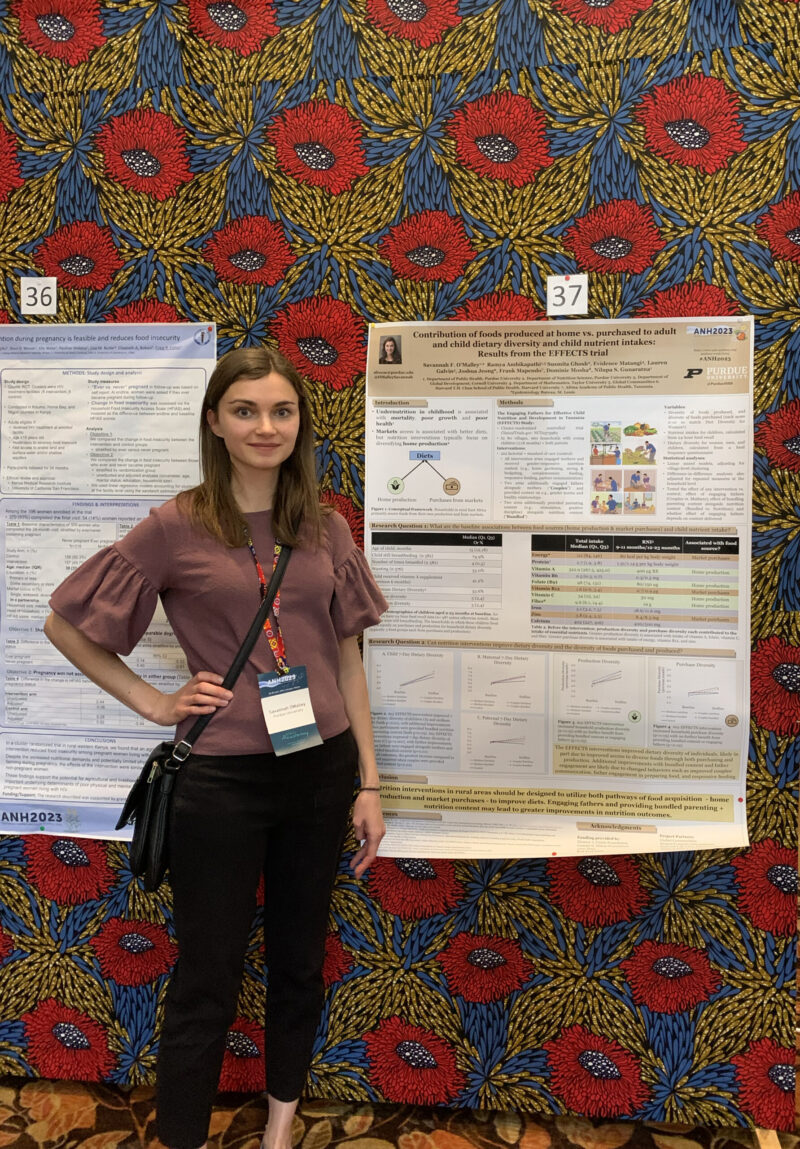Purdue Public Health and Nutrition Science researcher earned opportunity to expand African food systems focus

Savannah O’Malley, PhD candidate in the Department of Nutrition Science and Master of Public Health student, stands in front of her research poster at a summer conference in Malawi.
Written by: Tim Brouk, tbrouk@purdue.edu
Savannah O’Malley’s passion for combatting malnutrition and obesity in Africa drew attention from sources beyond the Purdue University College of Health and Human Sciences (HHS). The PhD candidate in the Department of Nutrition Science and Master of Public Health student and her research history on food systems and household nutrition in the Mara region of northern Tanzania piqued the interest of College of Agriculture faculty and graduate students.
The Fishers, Indiana, scholar was given the opportunity to apply for the D. Woods Thomas Memorial Fund, a rarity for students working outside of the College of Agriculture. Sometime later, O’Malley was one of three recipients of the award. The $1,500 from the D. Woods Thomas Memorial Scholarship as well as HHS’ $400 Compton Graduate Research Travel Award and a $1,000 Travel Award for Professional Development from Public Health, fueled her summer travels to attend the Agriculture, Nutrition and Health 2023 Academy Week conference in Lilongwe, Malawi, and to conduct new food systems research in Kenya, which borders Tanzania.
Stepping outside of her departments and meeting researchers from other fields proved beneficial for O’Malley.
“I like seeing how people from different disciplines think about the same problems,” said O’Malley, who had previously worked for international agricultural organization ECHO Global Farm. “We’re all working on similar problems, but we might approach them a little differently.”
O’Malley’s work has impact in nutrition, public health and agriculture because it looks at the sources of food in African regions, both rural and urban.
In Kenya, O’Malley collaborated on a manuscript with Simon Kimenju, a leading researcher of food environments in the nation and point person for the Kula Vyema Centre of Food Economics. O’Malley combed over publicly accessible survey data from the country’s agricultural and health departments in order to correlate Kenyans’ health and where their food comes from. Like in the United States, obesity and cardiovascular disease are concerns in the nation of more than 53 million people. O’Malley is hoping to submit this manuscript to a peer-reviewed journal by the end of the year.
A second project was to present data from the Engaging Fathers for Effective Child Nutrition and Development in Tanzania study (EFFECTS) while in Malawi. This work is a buzzer-beater of sorts, as O’Malley will defend her dissertation on the nutrition and food systems of 960 households in Mara, Tanzania, in October. While the average household in the sample consists of seven people, O’Malley focused on children ranging in age from infancy to 3 years old and their parents. Grandparents and older siblings who still live in the home were not included. The EFFECTS trial has already contributed to conference posters and presentations, Global Communities’ EFFECTS webinar, an open-access article and more manuscripts on the way. The EFFECTS trial was conducted to improve diets and development of young children. O’Malley stated the purpose of her work with the EFFECTS data was to call attention to household purchases as a potential behavior to change and improve child diets.
Knowing where your food comes from is crucial. In the U.S., consumers can assess this information on labels or Google searches. Most of the Tanzanian families grew their own food but also shopped at local markets, and these items came from a variety of sources. This is a major part of a “food system” in O’Malley’s research field that intersects public health, nutrition and agriculture.
“A food system is really broad. A food system is everything from who’s producing the food: Who’s the farmer growing it at home? Are they selling it? What is the supply chain to the consumer?” said O’Malley, who spent six months in Tanzania before her Purdue career. “The food system also includes ‘How is that food processed before the consumer purchases it?’
“It also includes ‘How does the consumer interact with their food environment?’ What does the consumer see is available to them? The consumer may ask ‘What is affordable to me based on my income? What are my preferences? Ultimately, what am I going to buy and take home?’”
Diverse diets are critical for a young child’s development, O’Malley added. Nutrition in these early years has great influence in later years. O’Malley’s work looked at household behaviors in access — how much was grown at home and how much was purchased at a market. The research also looked at if the behaviors can be changed. Can we promote diverse household food purchases?
“If we change those behaviors, the child will have a better diet and nutrition,” O’Malley said. “The EFFECTS study encouraged the increase in diversity in the foods people are producing and the foods people are purchasing. The result is better child diets. We want children to grow up healthy and strong and able to go to school.”
After her December graduation, O’Malley expects to work for a nonprofit or government. Joining a higher academic program may come later.
“Hopefully I’ll continue to work on interventions to improve peoples’ diets,” she said.